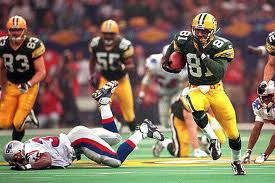He led the NFL in TD passes with 39 (3rdmost ever in a single season). He was second in the league in rating (95.8), third in completions (325), and 4th in yard (3,899), and threw just 13 Ints.

In December, he torched then 12-1 Denver, for 280 yards and 4 TDs, including three in the second half of a 41-6 pounding.
In the NFC Championship game, Favre helped guide the Packers back to the Super Bowl. He threw two first half touchdowns and for 292 yards in all, in Green Bay’s 30-13 victory over the Carolina Panthers.
In the Super Bowl Favre gave Green Bay an early lead with a bomb to Andre Rison for a 54 yard TD. He helped the Pack regain the lead on a perfect strike to Antonio Freeman. The second TD was the longest pass (81 yards) in Super Bowl history.

They smoked San Francisco 35-14 in the divisional round of the playoffs. After taking care of upstart Carolina, the Packers won their first Super Bowl in 29 years 35-21 over New England.Favre finished the day with 246 yards and added a rushing score.
Green Bay won the NFC Central with a 13-3 record, the best record in the NFC (tied with Denver for overall best record).
Favre directed the NFL’s top offensive(28.5 ppg) and Green Bay sported the league’s top defense as well (13.1 ppg).
2. Terrell Davis: He was the NFL Offensive POY, consensus first team All-Pro and an AFC Pro Bowler.
He led the AFC with 1,538 yards rushing, 1,838 all-purpose yards, and 345 carries. He was second in the conference in total TDs with 15.

He was 5th in the NFL with 4.5 yards per carry.

His breakout performance was 194 yards and 2 TDs vs. Baltimore.
Against eventual AFC champion New England he had 210 all-purpose yards (154 rushing) and 3 total TDs (all in the first half) in a 34-8 rout.
Davis ran 14 timesfor 91 yards (6.5 per rush) and added 7 receptions in the divisional round vs. Jacksonville.
His 4th quarter TD and two-point conversion cut the Jags led to 23-20, but Denver would not get any closer and were upset 30-27.
Denver, along with Green Bay, posted the top record in the NFL at 13-3. They won the AFC West by four games. Davis sparked the AFC’s 2nd leading scoring offense (24.4 PPG) and the NFL top rushing attack (2,362 yards).
3. Desmond Howard: Was the Super Bowl MVP. He set a Super Bowl record with 244 combined yards. His 99 yard kickoff return changed the game’s momentum, after New England closed within 27-21 late in the 3rd quarter.

With his performance in Super Bowl XXXI, Howard set Super Bowl records for highest career KR average (38.5), most PRs in a game and career (tied) with 6, and most PR yards in a game with 90.
His game changing return was the longest play in Super Bowl history, a record that stood for 12 years.
Howard was named first team All-Pro by Sporting News and the Pro Football Writers.
He set the current record with 875 PR yards on a league leading 58 returns (3rd most ever). He topped the league with three PR TDs (3rd most in a season.) He was second in the league with 15.1 yards per punt return.

In the divisional round vs. the 49ers, Howard sparked Green Bay to a 35-14 win.
His first touch of the game he returned 71 yards off a punt for the opening score, and ran back another punt 46 yards to set up the Packers second TD of the 1st quarter.
He returned four kicks for 104 yards in Green Bay’s NFC Championship route of Carolina.
Overall in the playoffs, he averaged 27 yards per return on punts and kicks (18-487).
He became the 4th player to win the Super Bowl MVP and Heisman Trophy. (Roger Staubach, Jim Plunkett, and Marcus Allen).
 His 4th quarter TD (his second
on the day) gave Denver their 14-10
final margin over top seed Kansas City in the divisional round. He finished
with 101 yards on the day.
His 4th quarter TD (his second
on the day) gave Denver their 14-10
final margin over top seed Kansas City in the divisional round. He finished
with 101 yards on the day. Favre threw 222 yards and a first half TD
that gave Green Bay a 10-0 lead they would never relinquish.
Favre threw 222 yards and a first half TD
that gave Green Bay a 10-0 lead they would never relinquish. 






























